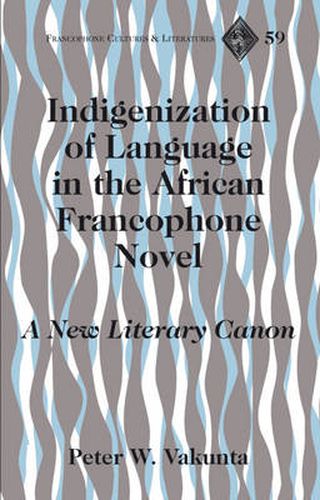Readings Newsletter
Become a Readings Member to make your shopping experience even easier.
Sign in or sign up for free!
You’re not far away from qualifying for FREE standard shipping within Australia
You’ve qualified for FREE standard shipping within Australia
The cart is loading…






This title is printed to order. This book may have been self-published. If so, we cannot guarantee the quality of the content. In the main most books will have gone through the editing process however some may not. We therefore suggest that you be aware of this before ordering this book. If in doubt check either the author or publisher’s details as we are unable to accept any returns unless they are faulty. Please contact us if you have any questions.
Indigenization of Language in the African Francophone Novel: A New Literary Canon discusses the question of indigenization in the African Francophone novel. Analyzing the prose narratives of Nazi Boni, Ahmadou Kourouma, and Patrice Nganang, this book contends that African literature written in European languages is primarily a creative translation process. Recourse to European languages as a medium of expressing African imagination, worldview, and cultures in fictional writing poses problems of intelligibility. Developed to express and reflect Western worldviews and sensibilities, European languages are employed by African writers to convey messages that seem to be at variance with European imagination. These writers find themselves writing in languages they wish to subvert through the technique of literary indigenization. The significance of this study resides in its raising awareness to the hurdles that literary creativity in a polyglossic context may present to readers and translators. This book provides answers to intriguing questions centering on the problematic of translation in contemporary African literature. It is a contribution to current research aimed at unraveling the conundrum surrounding the language question in African Europhone fiction, particularly the cultural functions of translation in literature. Potential translation problems have to be addressed in order to make African literature written in European languages intelligible to global readership. With the advent of globalization, transcultural communication has become an activity of enormous importance to the international community. It is a subject of great interest to translators, linguists, language instructors, and literary theorists.
$9.00 standard shipping within Australia
FREE standard shipping within Australia for orders over $100.00
Express & International shipping calculated at checkout
This title is printed to order. This book may have been self-published. If so, we cannot guarantee the quality of the content. In the main most books will have gone through the editing process however some may not. We therefore suggest that you be aware of this before ordering this book. If in doubt check either the author or publisher’s details as we are unable to accept any returns unless they are faulty. Please contact us if you have any questions.
Indigenization of Language in the African Francophone Novel: A New Literary Canon discusses the question of indigenization in the African Francophone novel. Analyzing the prose narratives of Nazi Boni, Ahmadou Kourouma, and Patrice Nganang, this book contends that African literature written in European languages is primarily a creative translation process. Recourse to European languages as a medium of expressing African imagination, worldview, and cultures in fictional writing poses problems of intelligibility. Developed to express and reflect Western worldviews and sensibilities, European languages are employed by African writers to convey messages that seem to be at variance with European imagination. These writers find themselves writing in languages they wish to subvert through the technique of literary indigenization. The significance of this study resides in its raising awareness to the hurdles that literary creativity in a polyglossic context may present to readers and translators. This book provides answers to intriguing questions centering on the problematic of translation in contemporary African literature. It is a contribution to current research aimed at unraveling the conundrum surrounding the language question in African Europhone fiction, particularly the cultural functions of translation in literature. Potential translation problems have to be addressed in order to make African literature written in European languages intelligible to global readership. With the advent of globalization, transcultural communication has become an activity of enormous importance to the international community. It is a subject of great interest to translators, linguists, language instructors, and literary theorists.